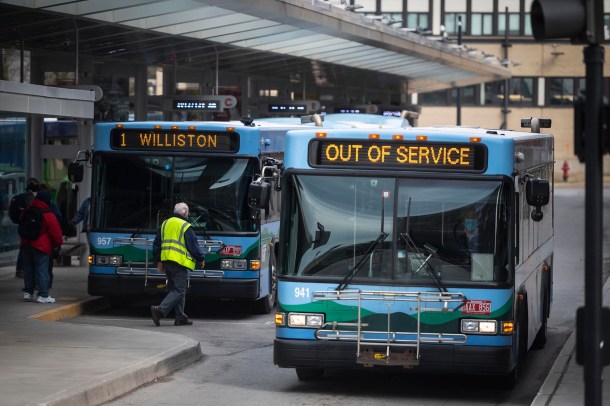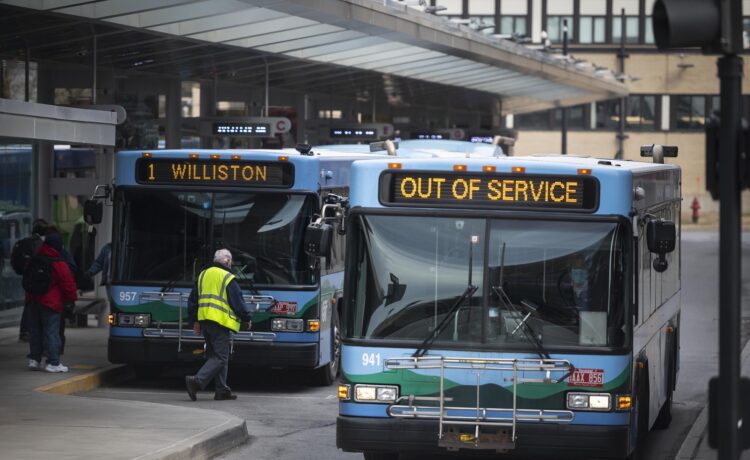
This story by Corey McDonald was first published by The Other Paper on Jan. 25.
The Green Mountain Transit Authority and Vermont legislators are looking for alternative funding sources for the agency as towns like Hinesburg question whether the fee assessments for municipalities are fair.
Hinesburg selectboard members claim there is an inequity in how certain municipalities pay for the service. The agency relies on funding from eight municipalities in Chittenden County — Burlington, South Burlington, Hinesburg, Shelburne, Williston, Essex, Winooski, and Milton — while other towns like Jericho and Underhill, for example, pay only minor contributions.
“There simply needs to be a more equitable distribution of what’s owed because it’s a heavy burden,” selectboard member Maggie Gordon said.
Assessment fees range as high as $2 million for Burlington to Hinesburg’s $52,980 — a 3.9 percent increase from last fiscal year, officials said.
GMTA general manager Clayton Clark agrees the methodology for assessments doesn’t make sense. GMTA is the only transit agency in the state considered a “municipality” and governed by a board of commissioners. The other six agencies are nonprofits. And while GMTA offers service throughout the state, municipalities that are considered “urban” are charged assessments while rural towns are donation-based, Clark said.
“That’s an inequity even within our own service that doesn’t make sense to me, that some of the people within our service areas have to pay the bill and other locations don’t,” Clark said.
The Legislature is looking into this, and last week received a 2023 report that investigates more than a dozen different new potential revenue sources that GMTA, and all transit agencies in the state, could draw on.
“There’s an understanding that it’s not fair and that public transit is going to run into some financial issues,”said Phil Pouech, Hinesburg’s state representative and a member of the House Committee on Transportation.
One key piece of the report said municipalities that are paying right now are tapped out, Pouech said. Some of the areas the report looks at is vehicle registration fees — “Probably not going to happen because they were just raised,” Pouech said — an additional tax on rental cars, retail delivery fees, and even a per capita tax for all of Vermont’s population “because they all benefit, and they all need transportation.”
The committee, Pouech said, would work hard “because it’s a definite need throughout the state of Vermont.”
Hinesburg currently has one commuter line that runs through town, the 116 Commuter, which runs four round trips a day inbound and outbound. Last year, ridership on that line was just over 3,000 riders — a 72 percent increase from the previous year, Clark said.
“To be frank, 3,000 for a route is one of the lower riderships that we have,” he said. “But I’m really happy to see that it had a significant increase over the previous year, and I hope that that will continue.”
Since the pandemic, higher density “urban” routes have rebounded much faster than commuter and link routes that go through rural areas or, for example, connect Montpelier or St. Albans to Burlington, Clark said.
Despite this rebound, GMTA is still facing pressures, both financial and labor related.
About one in three bus routes last year were covered by somebody who was working an overtime shift, making time-and-a-half or double time. The agency’s contract allows them to force overtime to ensure services are operating.
An adjustment to the starting wages has helped them bring on additional staff, Clark said, but labor pressures remain their biggest threat.
“The lack of CDL drivers is something that in the future is probably one of our biggest threats when it comes to maintaining service,” Clark said.
Last year, the transit authority announced it would be reinstating fares to brace for the loss of federal Covid-19 relief funds set to exhausted in fiscal years 2026 and 2027. Those fares will restart on March 6, although Hinesburg’s route will not have fares because it’s partly aided by Tri-Valley Transit.
“My top priority as the general manager is finding revenue replacement to replace the Covid relief funds,” Clark said during a Hinesburg Selectboard meeting, “I want to ensure you that I’m not going to be looking to municipalities to be the main source for where that increase is going to happen because we already know that you all are going through many of the same cost pressures that we have.”
Merrily Lovell, the chair of the town’s, said the town doesn’t have any issue with the service itself, “but our understanding is there are surrounding towns that don’t pay anything. We pay quite a steep price … I think we feel generally that it’s not equitable if we’re paying and our neighbors are not paying.”
Pouech cautioned that, while the Legislature is looking into alternative sources, it would not necessarily decrease what Hinesburg would be paying.
“The hope is that it would reduce the demand on the municipalities that are members of GMTA and provide the additional funds that GMTA and the other public transit organizations need,” he said.















